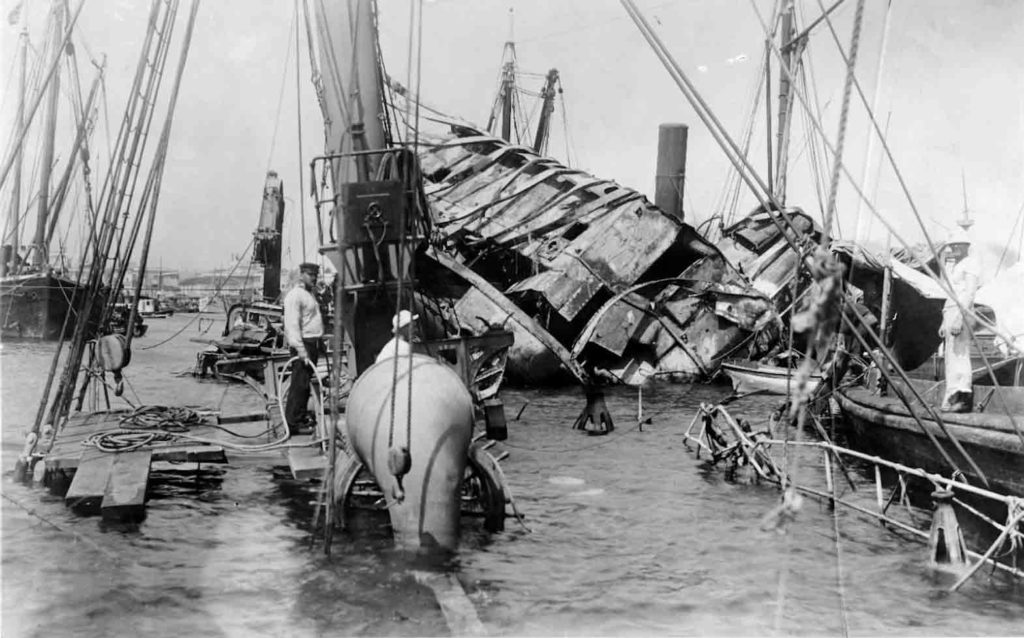‘Remember the Maine’ and the U.S. rush to war with Spain in Feb. 1898

Post-explosion wreckage of USS Maine: Americans who had been advocating for war against Spain for months blamed the Spanish for the sinking.
This month marks the 125th anniversary of the U.S.S. Maine’s explosion at Havana harbor, Cuba. The massive explosion occurred at 9:40 p.m. on the February 15, 1898.
Immediately, Americans who had been advocating for war against Spain for months blamed the Spanish for the sinking of the U.S.S. Maine. There was an enormous American rush to war against Spain.
Spain’s colony in the Caribbean was in a state of revolt and chaos. The American president, William McKinley, on January 25, 1898, sent a modern U.S. Navy vessel to Cuba to show American resolve and to protect United States economic and political interest.
“Yellow” journalism in the United States had been exaggerating and embellishing Spanish brutality in Cuba for years. A reasonable analysis of the cause and responsibility of the Maine explosion by a U.S. Naval Court of Inquiry was irrelevant. At this point, war between Spain and the United States was inevitable.
The Maine had of crew of 400 officers and sailors. More than 260 crewmembers perished in the explosion. Although many Americans were accusing Spain of an attack, the Spanish authorities including its military, as well as civilians, helped in the rescue effort after the disaster. The Spanish also conducted its own inquiry on the cause of the tragedy.
There were many causes for the Spanish-American War of 1898, but the sinking of the Maine was the immediate catalyst. The American government declared war against Spain on April 25, 1898. Prior to the declaration, an argument was made that the explosion could have been caused by an internal mechanical failure. However, the chant, “Remember the Maine” became the rallying cry against alleged Spanish treachery.
The American declaration of war against Spain had many unique and unknown challenges beyond a fight over Cuba. Spain still had colonial control of the Philippines in Asia. There were many contemporary parallels between the unrest in Cuba and the Philippines, but most American policymakers had at least a small understanding of the situation in Cuba. The had little to no knowledge of Philippine issues.
Approximately ten days after the Maine explosion, United States Assistant Secretary of the Navy Theodore Roosevelt ordered the American Asiatic Fleet to sail to Hong Kong. The fleet was placed on high alert. Roosevelt knew that Spain had naval assets in the Philippines, which could possibility threaten the West Coast of the United States.
Coincidentally, when the American Asiatic Fleet arrived in Hong Kong, the Philippine revolutionary government in exile had recently established itself there. The government in exile was known as the “Hong Kong Junta” and was under the leadership of Emilio Aguinaldo, along with approximately 20 of his lieutenants. They had departed the Philippines at the end of December 1897 on the steamer Uranus to Hong Kong, under the terms of the Pact of Biak-na-Bato signed on December 15, 1897.
The pact was essentially an agreement or truce between Aguinaldo’s Katipunan forces and the Spanish colonial government and military in the Philippines. In addition to exile, Aguinaldo’s forces were slated to receive cash payments from the Spanish. Both parties violated the terms of the pact. Aguinaldo continued to monitor events in the Philippines. He also smuggled provisions, medicine and weapons to the archipelago.
While in Hong Kong, Emilio Aguinaldo eventually met with American military and government authorities regarding mutual interest against Spain. The saying “The enemy of my enemy is my friend” certainly applied in this tense situation.
Aguinaldo met with the U.S. Consul in Singapore, E. Spencer Pratt. Aguinaldo thought that he had Pratt’s solid commitment for Philippine independence in exchange for an American and Filipino alliance to defeat Spanish colonialism in the Philippines.
In retrospect, Aguinaldo most likely had the commitment from the U.S. Consul. Unfortunately, Pratt was likely only being expedient and opportunistic in the short term. He did not have the authority to make promises and policy for the United States Department of State and/or the War and Naval Departments in Washington D.C.
It is troubling that the basis and the foundation for the Spanish-American War in Cuba and the Philippines depended on a questionable analysis on the Maine’s explosion. The prevailing thought by the United States was that the disaster was the result of an external mine attack either by Spain or the Cuban rebels who wanted the United States to intervene in Cuba.
In 1974, the U.S. Navy under the leadership Admiral Hyman Rickover reviewed the explosion of the Maine. The study determined that the explosion was internal not external and caused by spontaneous combustion in a coal bunker. This problem had occurred on other U.S. Navy ships powered by coal. The ships had a design flaw. The coal bunkers were located next to the powder magazines and only separated by a thin metal wall.
Unfortunately, the “Remember the Maine” chant in 1898 turned out to be based on mythology, not historical truth.
Dennis Edward Flake is the author of three books on Philippine-American history. He is Public Historian and a seasonal park ranger in interpretation for the National Park Service at the Eisenhower National Historic Site in Gettysburg, PA. He can be contacted at: flakedennis@gmail.com

